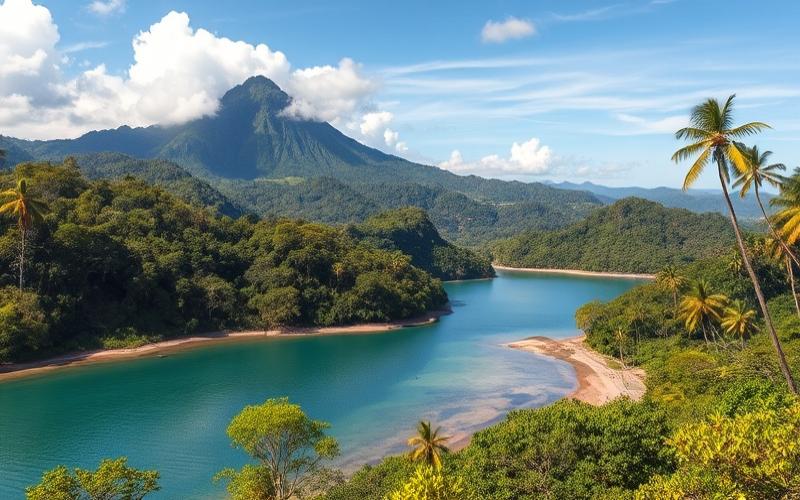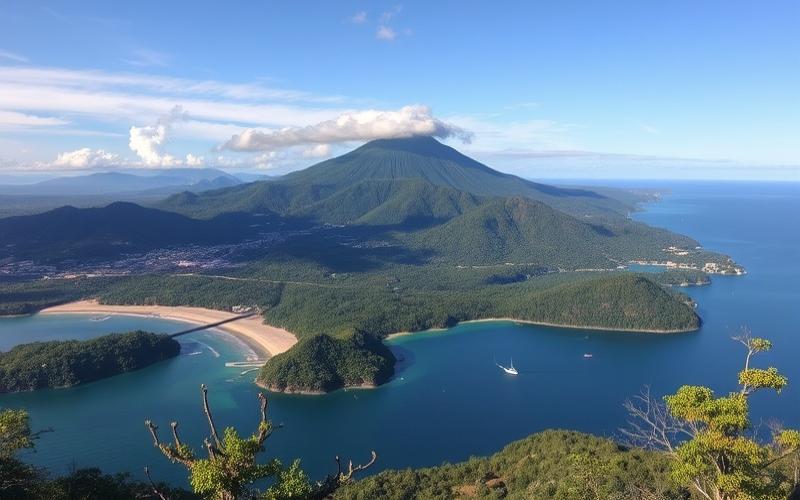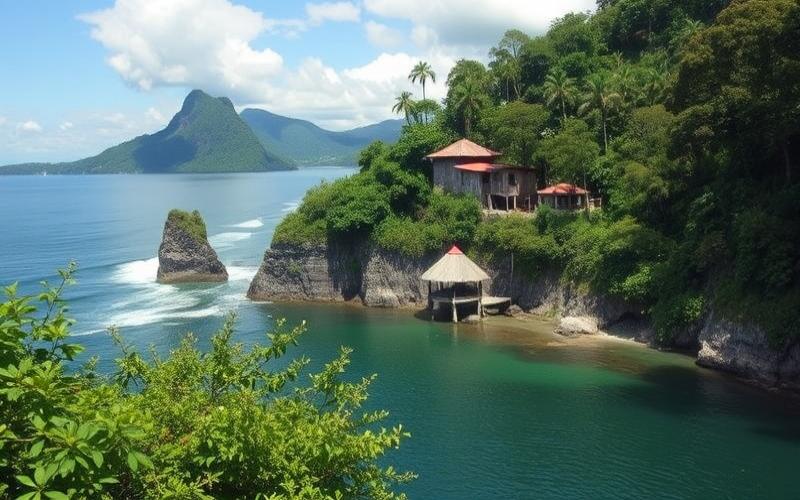
 Published on and written by Cyril Jarnias
Published on and written by Cyril Jarnias
Investing in Real Estate in Costa Rica
Investing in real estate in Costa Rica isn’t just an opportunity to benefit from stunning landscapes and rich culture—it’s also a unique chance to take advantage of attractive tax benefits and grow your wealth.
As the country attracts more and more foreign investors, particularly due to its incentive-based tax policies and favorable legal framework, it’s crucial to understand how these elements can transform an investment into a genuine goldmine of opportunities.
With highly competitive real estate income taxation and no capital gains tax on property, Costa Rica stands out as a haven for those looking not only to diversify their portfolio but also to enjoy solid long-term financial returns.
Good to Know:
Costa Rica does not levy any capital gains tax on real estate, making it a highly attractive destination for international investors.
Local Tax Benefits for Investing in Costa Rica
The main tax incentives offered by Costa Rica to foreign investors come in several attractive components designed to stimulate investment and support local economic development:
- Tax Exemptions on Real Estate Investments
- Foreign investors benefit from a very favorable tax regime: only income generated within Costa Rican territory is taxed, while income from abroad is not subject to taxation.
- The annual property tax is low (0.25% of the registered property value).
- Property transfer taxes upon acquisition remain moderate (1.5%).
- There is no generalized wealth tax or capital gains taxation on real estate for certain specific cases.
- Residency Programs for Retirees and Investors
- The investor visa is accessible with a minimum investment of $150,000 USD in real estate or local productive projects.
- This program grants a renewable temporary residence, which can become permanent after three years.
- Temporary residents enjoy a tax environment where their pensions or other income received outside Costa Rica are not subject to local taxation.
- Special Economic Zones (“Free Zones”)
| Benefit | Description |
|---|---|
| Corporate Tax Exemption | Initial period (8 years): reduced rate down to zero |
| VAT Exemption | On imports of equipment and raw materials |
| Social Security Contribution Reductions | Depending on sector and geographic location |
These zones primarily target technology, industrial, or logistics sectors. They encourage the creation of skilled local jobs and contribute to technology transfer.
How Do These Measures Stimulate Foreign Investment?
- By significantly reducing the tax burden on newcomers as well as established foreign companies, the government creates a climate conducive to entrepreneurial risk-taking.
- The absence of taxation on worldwide income particularly attracts wealthy retirees and digital entrepreneurs looking to optimize their tax situation while enjoying Costa Rica’s stable environment.
- The Free Zone provisions directly promote regional industrial development and local skills enhancement through the large-scale establishment of international companies.
Comparisons with Other Latin American Countries
| Country | Taxation of Non-Residents | Major Exemptions/Incentives |
|---|---|---|
| Costa Rica | Tax only on national income | Investor visa from $150,000 USD; Free Zones; low property taxes |
| Panama | Territorial tax system | “Friendly Nations Visa”; exemption on foreign taxes; free trade zones |
| Mexico | Partial worldwide taxation | Investor residency >$200,000 USD; sometimes high property taxes |
| Colombia | Worldwide taxation | Investor Visas (>$160,000 USD) but global taxation |
Costa Rica stands out for superior administrative transparency, internationally recognized legal stability, and a proactive policy focused on sustainable development—all factors that strengthen its competitiveness compared to its neighbors.
Costa Rica’s territorial tax system combined with its targeted exemptions places the country among the preferential destinations for those seeking legal security, real tax relief, and an environment conducive to real estate or entrepreneurial development.
Good to Know:
Costa Rica offers several attractive tax incentives for foreign investors, such as tax exemptions on real estate investments, which often include income tax reductions for a set period. Retirees choosing to settle in Costa Rica can benefit from residency programs offering specific tax relief, making the country particularly appealing for this category. Additionally, special economic zones provide tax reductions to encourage local economic development, allowing businesses to lower their costs. Compared to other Latin American countries, Costa Rica stands out with these competitive advantages that strengthen its position as a preferred destination for real estate investment, thereby stimulating the economy while attracting foreign capital.
Avoiding Double Taxation: An Advantage for International Investors
Costa Rica has established Double Taxation Avoidance Agreements (DTAAs), providing a major advantage for international real estate investors. These agreements prevent multiple taxation on the same real estate income, thereby reducing the overall tax burden and enhancing the country’s appeal for foreign investment.
Main Tax Treaties Signed by Costa Rica
| Partner Country | Year Signed | Main Scope |
|---|---|---|
| Spain | 2010 | Income and capital gains, corporate and individual taxes |
| Mexico | 2014 | Various income, dividends, interest |
| Germany | 2016 | Business income, dividends |
- Costa Rica also applies certain provisions of the MLI (Multilateral Instrument), strengthening its anti-abuse measures in treaties with Spain and Mexico.
- The treaties typically cover personal and corporate income taxes as well as property taxes related to real estate.
How Do These Agreements Minimize the Tax Burden?
- Elimination of Double Taxation: A foreign investor resident in a country with a DTAA with Costa Rica does not pay tax twice on the same real estate income. Generally:
- Tax paid in Costa Rica is deducted or credited in the country of origin.
- Certain types of income even benefit from partial or total exemption according to the applicable treaty.
- Reduction of Withholding Taxes: The withholding rates applied to distributions (rents, capital gains) paid to non-residents can be capped or even eliminated based on the specific provisions of the relevant bilateral treaty.
Concrete Example
A Spanish citizen receiving rental income from a property located in Costa Rica:
- Will normally pay local Costa Rican tax on this income.
- Thanks to the Spain–Costa Rica DTAA, they can credit this tax paid against the tax due in Spain for the same rental income.
- If their Spanish marginal rate is higher than the Costa Rican rate paid, they will only settle the residual difference; otherwise, no double charge is incurred.
Positive Tax Implications for Foreigners
List of main advantages:
- Legal limitation of cumulative taxation between partner states
- Administrative simplification via issuance of tax certificates proving effective residence
- Increased legal security regarding cross-border tax treatment
- Potential lowering of total tax cost upon resale or regular receipt of rental income
Practical Case
A Mexican investor acquires a tourist apartment in Guanacaste:
- They regularly rent their property to international tourists.
- The tax paid on local rental income can be accounted for in their Mexican tax return thanks to the Mexico–Costa Rica DTAA—thus avoiding full secondary taxation in Mexican territory.
The adopted measures significantly improve the international attractiveness of the Costa Rican real estate market:
By strongly limiting cross-border tax risk through signed international tax treaties (Spain, Mexico…), Costa Rica positions itself as a preferred destination for foreign real estate investment seeking legal stability and legal tax optimization.
Good to Know:
Costa Rica has established double taxation agreements with several countries, including Spain and Germany, providing a major advantage for international real estate investors by reducing their tax burden. These tax treaties prevent paying taxes on the same income in two jurisdictions, which is particularly beneficial for foreign citizens investing in Costa Rica’s real estate sector. For example, a Spanish investor owning a rental property in Costa Rica can deduct taxes paid in Costa Rica from their income tax in Spain. Such provisions increase Costa Rica’s appeal as an investment destination, as they guarantee tax optimization on rental income and capital gains realized in the country, making the investment not only tax-efficient but also more profitable in the long term.
Understanding Property and Residence Taxes in Costa Rica
The property tax in Costa Rica (Impuesto sobre Bienes Inmuebles) applies to all property owners, whether residents or foreigners. It is levied by the municipality where the property is located.
| Element | Detail |
| Applicable Rate | 0.25% of the fiscal value of the property |
| Calculation Basis | Value declared to the town hall (often 2 to 3 times lower than market value); mandatory revaluation every 5 years |
| Payment Deadlines | Payable in advance for the entire year starting January 1st, or quarterly |
| Procedures | No notice is automatically sent; it is the owner’s responsibility to initiate payment with their municipality |
Important points for property owners:
- Non-payment can lead to penalties and potentially seizure.
- The absence of an official notice does not exempt from payment.
- The tax is relatively low compared to international standards.
There is no separate “residence tax” in Costa Rica.
Only exception: specific cases like maritime concessions may generate additional fees but, as a general rule, only one annual property tax is due on each property.
Regarding foreign investors:
- No special treatment or specific exemption is provided for them regarding this tax.
- No reduction applies specifically to standard real estate investments. However, incentive regimes sometimes exist in certain strategic sectors or under very specific conditions.
Regional Comparison
| Country | Rate/Main Characteristics |
| Costa Rica | Fixed rate 0.25% on low fiscal value; five-year declaration; absence of residence tax |
| Panama | Progressive scale up to 2.1%, possible exemptions for properties |
Global Comparison: Costa Rica vs. Other Destinations
Costa Rica: Tax Benefits for Real Estate Investors
- No Capital Gains Tax: Individuals are not taxed on real estate capital gains, provided they do not make more than three sales per year (beyond that, the activity is considered professional and may be taxed).
- No Wealth Tax, Inheritance, or Gift Taxes.
- Territorial Taxation: Only income generated in Costa Rica is taxed; foreign-source income is not.
- Tax on Rental Income: 15% rate on net income after deduction of eligible expenses.
- Annual Property Tax: 0.25% of the cadastral value of the property.
- Incentives for Retirees: Residency programs (“Pensionado”, “Rentista”) allow obtaining residence with moderate financial requirements, without specific taxation on foreign pensions.
International Comparison of Tax Regimes
| Country | Real Estate Capital Gains | Wealth Tax | Inheritance/Gift Taxes | Rental Taxation | Retiree Incentives | Foreign Income Taxation | Other Assets |
| Costa Rica | Not taxed (≤3 sales/year) | No | No | 15% on net income | “Pensionado”/”Rentista” programs | Not taxed | Stability, simplicity |
| Panama | 10% on capital gain | No | No | 10% on gross rents | Retiree visa, tax benefits | Not taxed | US Dollar, free zone |
| Portugal | 28% (non-habitual residents: 0% on certain income) | No | Yes | 28% on rental income (excluding NHR) | NHR regime: low taxation on pensions | Variable | Climate, EU access |
| United States | 15-20% (residents), 30% (non-residents) | Yes (some states) | Yes | Progressive federal+state rates | No specific advantage | Worldwide taxation | Deep market, stability |
Examples and Recent Data
- In Costa Rica, observed gross rental yields range from 7% to 11% per year in residential, up to 17% in beachfront hospitality.
- Panama appeals for the simplicity of its retiree visa and the use of the US dollar.
- In Portugal, the influx of foreign investors was stimulated by the NHR regime, but benefits are gradually being reduced (end of “Golden Visa” for real estate).
- In the United States, the market is solid but capital gains tax and inheritance taxes can be high for non-residents.
Non-Tax Factors Affecting Attractiveness
- Political and Economic Stability: Costa Rica is recognized for its stable democracy, absence of a military, legal security, and steady growth in the tourism sector.
- Administrative Simplicity: Streamlined procedures for property purchase, transparency of land titles.
- Accessibility: Direct flights from North America and Europe, attractive climate, good quality of life.
- Portugal: Security, access to the Schengen Area, Mediterranean climate.
- Panama: International financial hub, dollarized economy, modern infrastructure.
- United States: High legal security, but administrative complexity and higher management costs.
Visual Summary of Costa Rica’s Strengths
| Key Advantage | Detail |
| No Capital Gains Tax | Up to 3 sales/year |
| Moderate Rental Taxation | 15% on net income |
| No Inheritance/Gift Taxes | Facilitated transfer |
| Political and Economic Stability | Democracy, no military |
| Attractive Residency Programs | Retirees, rentiers |
| Simplified Procedures | Limited acquisition procedures and costs |
Costa Rica particularly attracts real estate investors seeking light taxation, political stability, and a privileged living environment, clearly distinguishing it from Portugal, Panama, or the United States on these criteria.
Good to Know:
Costa Rica stands out with a particularly advantageous tax policy for real estate investors, including the absence of capital gains tax and tax incentives for retirees, making it attractive compared to destinations like Panama or Portugal, where specialized tax regimes exist but with certain restrictions. Unlike the United States, where taxes can quickly escalate, Costa Rica offers encouraging political stability and marked tax exemption within a resilient economy. For example, a recent analysis showed that 60% of investors chose Costa Rica for the economic security associated with these tax benefits, compared to 45% for Panama. Nevertheless, Portugal appeals with its Golden Visa program, although capital gains taxation remains heavier there. These elements, combined with an assessment of infrastructure and economic climate, significantly influence real estate investment decisions, with Costa Rica often coming out ahead in these comparisons.
Disclaimer: The information provided on this website is for informational purposes only and does not constitute financial, legal, or professional advice. We encourage you to consult qualified experts before making any investment, real estate, or expatriation decisions. Although we strive to maintain up-to-date and accurate information, we do not guarantee the completeness, accuracy, or timeliness of the proposed content. As investment and expatriation involve risks, we disclaim any liability for potential losses or damages arising from the use of this site. Your use of this site confirms your acceptance of these terms and your understanding of the associated risks.















































